When Does Discover Report to Credit Bureaus?
If you're using your Discover Card for major purchases and are trying to improve your credit score, you're probably wondering . Maybe you're looking at your credit report and aren't seeing the improvements you'd hoped for—or you're not seeing your recent payments reflected in your score. Maybe you just missed a payment and are wondering if and when it will damage your score.
If you're trying to fix your credit score, it may help to know when Discover will report your payments, but awareness shouldn't be your only measure. You may need to dispute inquiries, remove collections or late payments, or file a debt validation letter. Credit scores are complicated, and you may notice mistakes on your report—which means you'll need to dispute the credit report.
No matter what credit challenges you're facing, they're bound to be stressful and time-consuming. Dispute letters must be carefully crafted and sent to the right people. DoNotPay can help you navigate these situations and outline the steps you need to take to fix your credit score.
What Information Does Discover Report?
will typically share the following information with the credit bureaus:
- Your personal information
- Date you opened the account
- Type of account
- Your credit limit
- Account balance
- Payment history
- Account status (current or late)
Do All Credit Card Companies Follow the Same Reporting Process?
No. There are a variety of factors that determine how each company does their reporting since there are no standards or requirements in place. Most will report once a month, after your closing statement, but they may not report to all the bureaus, or they may not report it every time.
When Does Discover Report to Credit Bureaus and What Does It Mean for My Score?
Discover reports your account information to the credit bureaus within a couple of days of the end of your billing period. However, those changes won't necessarily be immediately reflected on your credit report. It can take the credit bureaus a couple of weeks to refresh your score.
Factors at Play
- If you have a history of on-time payments, your latest on-time payment probably won't have a big impact.
- Even with a history of on-time payments, one payment that's more than a month past due will probably have a noticeable negative impact on your score.
- If you have a history of late payments and you make a big improvement on your card balance, you may see an improvement in your score.
- You may notice errors in your report that are impacting your score, and you will need to get those removed.
- You may notice debts that have been paid off are still being noted as unpaid in your report, and you will need to get that corrected.
How to Take Charge of Your Finances and Clean Up Your Credit Report on Your Own
Keeping track of is just one step in taking charge of your finances. You should examine your credit report to look for errors, and get them corrected immediately. This is especially important if you're trying to improve your credit score to apply for a loan to start a business or buy a home.
Sometimes, there are no mistakes on your report, but there are still items that are hurting your score and preventing you from getting a loan. These may include past debts that have since been taken care of or debts that cannot be proven to belong to you.
Say, for example, that you have unpaid medical debts that have been sent to collections, but you have an otherwise upstanding credit history. The medical bills were simply too high during a stressful time in your life, and you weren't able to pay them on time. You could write a goodwill removal request, explaining the situation and how you're resolving it, to ask for that item to be removed from your credit report. It doesn't mean you won't be responsible for the debt, but it does mean your score could improve to a point that you'll qualify for a necessary loan.
To clean up your credit report, you have to know your options and what steps to take. This requires time and research, and you may be confronted with conflicting information. Don't worry. Simply turn to DoNotPay to help you streamline the process.
A Short Guide on How to Keep a Good Credit Score
Here are some guidelines to keep your credit score in tip-top shape.
| Pay Your Bills Promptly | To make sure you can keep up with your repeating payments, it would be best to set up an automatic payment system, or perhaps use electronic reminders. |
| Make Sure You Credit Doesn’t Get Close to its Credit Limit | Credit scoring models pay close attention to how close you are to being maxed out. Having a maxed-out credit card will lower your overall credit score which has a long-term effect on your finances That is why it's important to keep your credit balance low to avoid being buried in a mountain of debt. |
| Having a Long Credit History Will Help With Your Credit Score | Credit scores are also based on experience over time. The more experienced your credit reports are with timely payments, the more it shows that you are a good credit recipient. |
| Only Apply for the Credits That Truly Need | Credit scoring formulas are always aware of your recent activity and are the ones that give the signal to lenders if you require credits. Once you’ve applied for a lot of credit in a short period of time, this may raise a huge red flag to lenders regarding your financial direction. |
| Always Make Sure That Your Credit Reports Have No Errors. | If ever you spot any suspected errors, swiftly dispute them. This goes to all of your credit cards. Make sure that you are not mistakenly charged. |
How to Improve Your Credit Score With the Help of DoNotPay
You don't have to figure this out on your own. DoNotPay makes it easy to obtain your credit report and improve your score by filing letters on your behalf to prove the debt is yours, remove errors, or negotiate a payment plan to have an item removed. This is how it works:
- Search Clean Credit Report on DoNotPay.
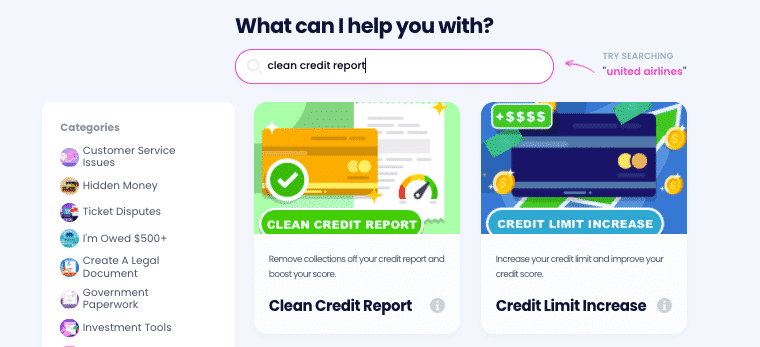
- Prepare a recent copy of your credit report that you can use as reference.
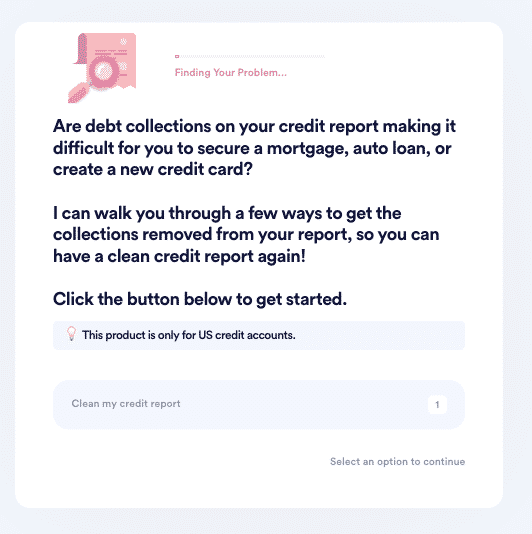
- Let us guide you through the 4 potential options:
- If you've already paid off your debt, we'll help you file a Goodwill Removal Request to get it removed.
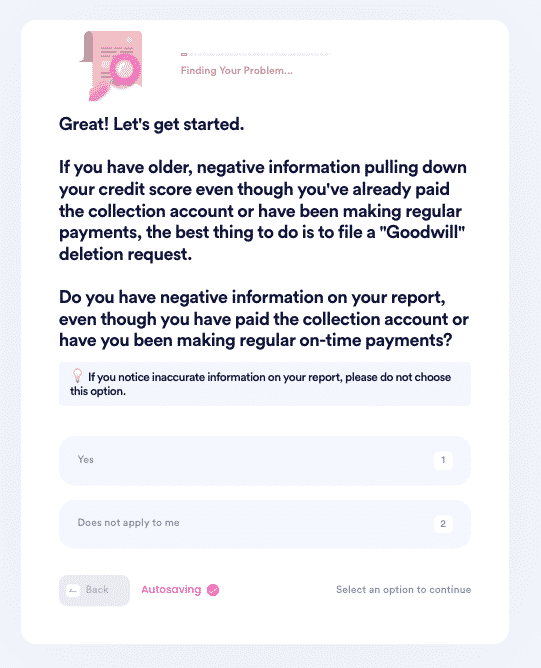
- If you notice any errors in your report (we have a list of common errors you can use!), we'll help you file a credit dispute to the creditor or major credit bureaus.
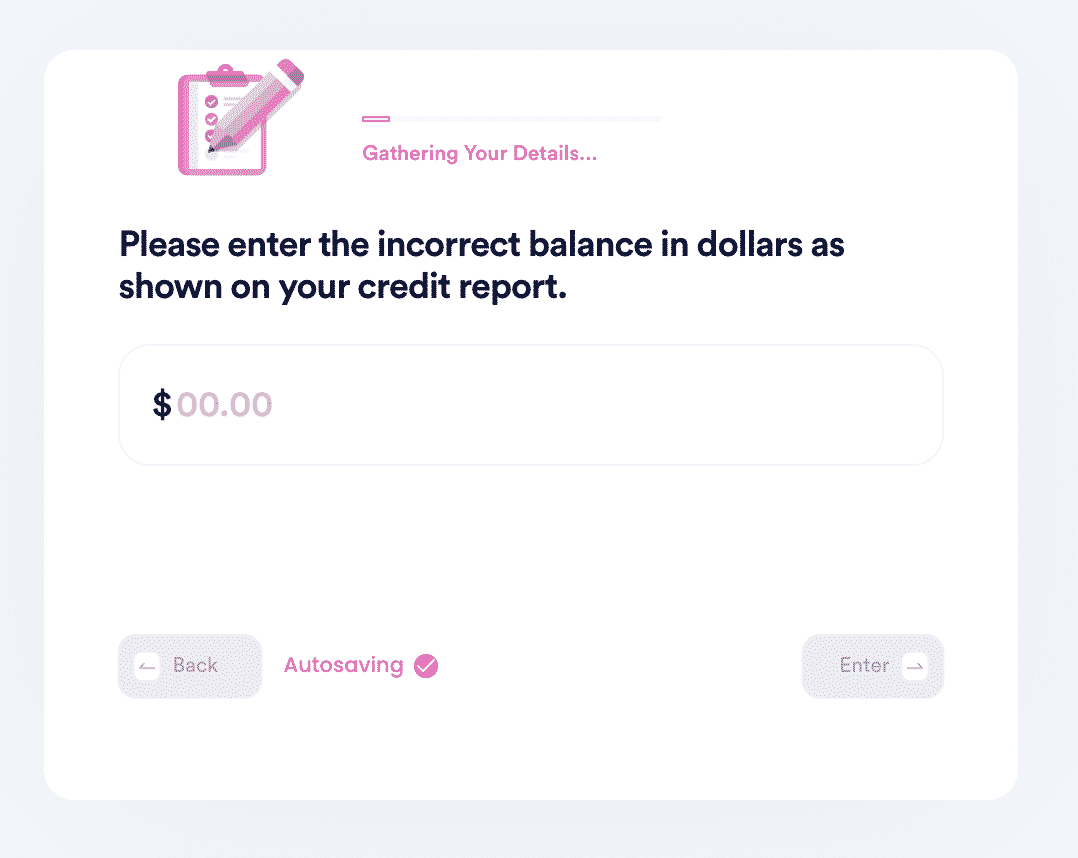
- If there are no errors, we'll check if you're still eligible to file a debt validation request. If they can't validate your debt, they're required to remove it from your report and they can't collect it!
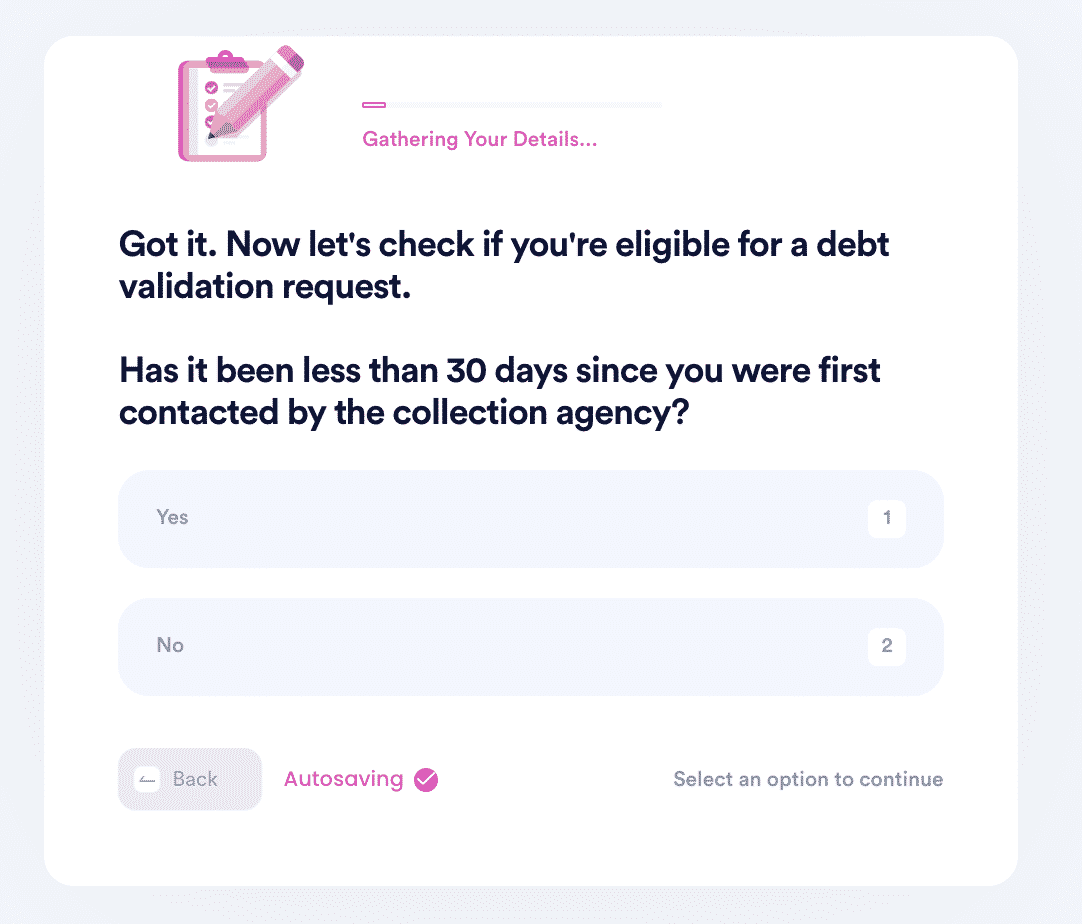
- Lastly, if none of the above options work, we'll help you file a pay-to-delete negotiation letter. You can customize the amount you are willing to pay in exchange for getting the item removed.
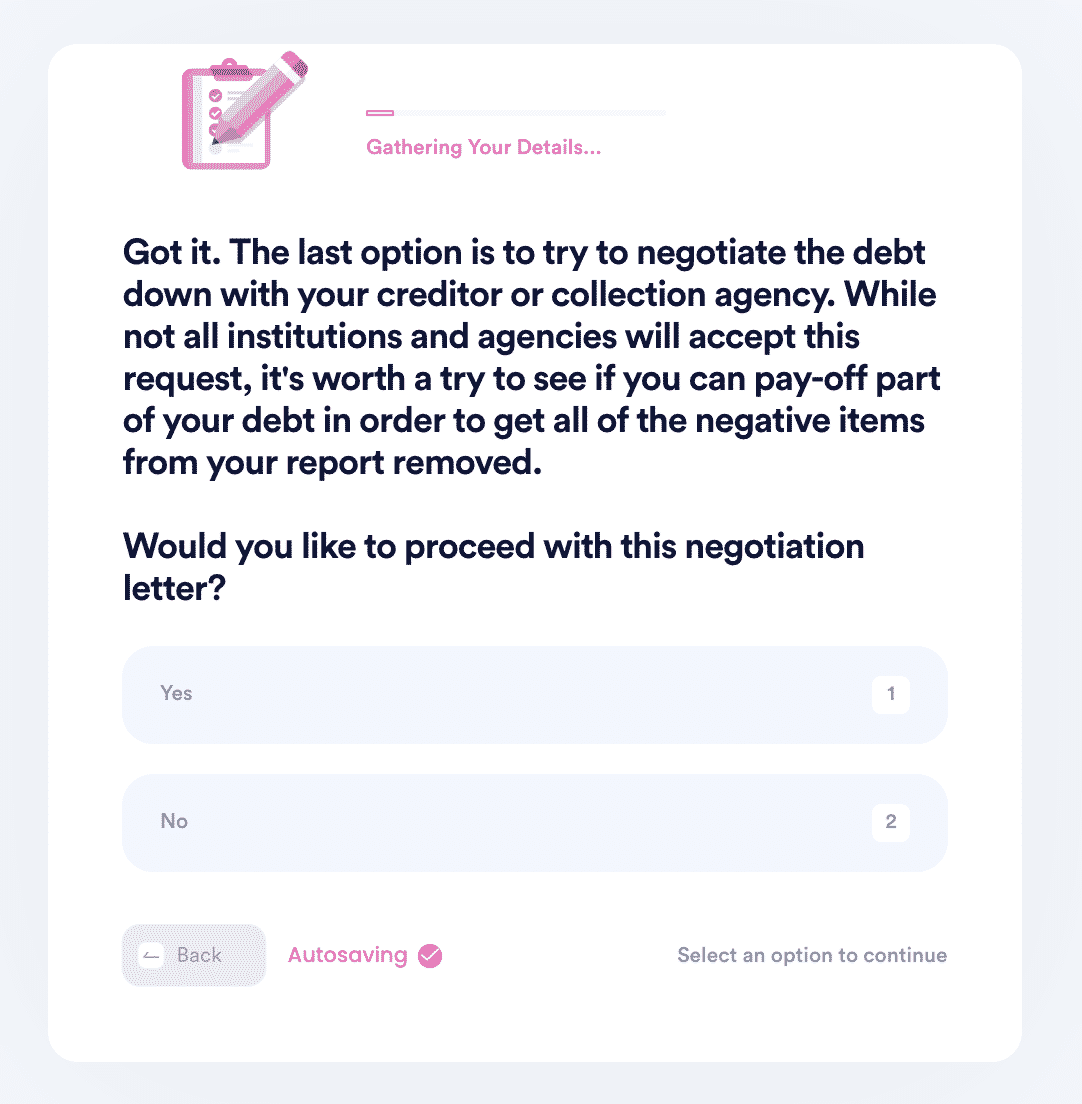
It's fast and easy, DoNotPay also features a variety of other credit-related services, including Increase Your Credit Limit and Keep Unused Cards Active, to help you manage your finances. It's one of many ways we make life simpler for you.
What Else Can DoNotPay Do?
Life's most common challenges are often some of the most confusing. Figuring out how to send demand letters to someone in small claims court, file a complaint, or improve your credit score is not easy, which is why DoNotPay is here to help. Take a look at everything we can do:
- Find unclaimed money
- Cancel a service or subscription
- Get money back for unused gift cards
- Write a financial aid appeal letter
- File an insurance claim
- Get a refund for late deliveries
- Get help with your bills
- Report price gouging
- Pay your bills online
- Get compensated for a delayed or canceled flight
Save time, money, and hassle by using DoNotPay to help you navigate these challenging situations.
 By
By